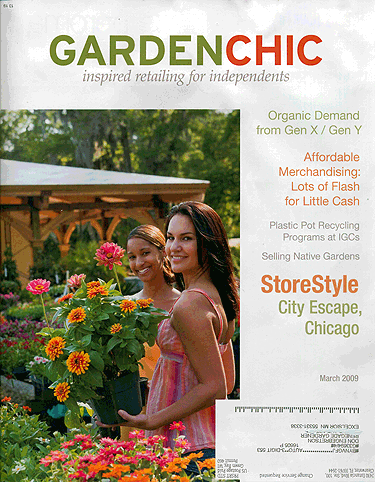RENEGADE GARDENER™
The lone voice of horticultural reason
Don’t treat organic pesticides and fungicides as if they pose no danger to your health.
 I was horrified by an article in the March, 2009 issue of GARDENCHIC, a magazine for independent garden retailers. In the article “Going Green,” the owner of a garden center in Garden Valley, California, had this to say:
I was horrified by an article in the March, 2009 issue of GARDENCHIC, a magazine for independent garden retailers. In the article “Going Green,” the owner of a garden center in Garden Valley, California, had this to say:
“For soft-bodied pests, I walk (the consumer) over to our E.B. Stone line, and we talk about the Rose-N-Flower Insect Spray,” says [the owner]. “People look at it and say, ‘Is it dangerous?’ I say, it’s an organic spray, made out of pyrethrins, which come from the chrysanthemum flower, and it’s considered organic—but try to avoid getting it on your hands, and keep pets indoors until it’s dry.” The writer then states, “He calls this his ‘it’s organic, but…’ speech.”
Hey there fella, you really should be filling in your trusting customers with a bit more information about a nerve toxin than an off-handed “but…” speech.
Pyrethrins are highly toxic, organic chemicals derived from the flowers of the African daisy, which is indeed in the genus Chrysanthemum. It disrupts nerve impulses in humans, animals, and insects, and is commonly used in wasp sprays. Give a flying wasp a tiny whiff of it, and the wasp drops dead. The product derived from pyrethrins is named pyrethrum.
As Jeff Gillman states in his book, The Truth About Organic Gardening (Timber Press, 2008), “Pyrethrum affects the transmission of nerve impulses to and from the brain. This would seem to make it a pretty dangerous compound for humans, except that humans have an enzyme that detoxifies it before it reaches the nerves where it can do damage. That doesn’t mean this compound is safe, though, and it should be considered dangerous by anyone using it.”
For the sake of safety, I would like to point out that infants do not have a very large build-up of this enzyme, which is why pyrethrum-based wasp sprays SHOULD NEVER be used in a room or house where an infant is present. Brain damage and respiratory failure can result.
What this nouveau-chic nursery geek should be telling people is the truth, that when using Rose-N-Flower organic chemical insect spray, they need to wear rubber gloves, long sleeves, and long pants, the same exact procedure as when using synthetic (non-organic) chemical sprays. Absorption of pyrethrum into the skin can cause itching. If inhaled, or accidentally ingested (say, by your three-year-old), pyrethrum products can bring about asthmatic breathing, sneezing, nasal stuffiness, headache, nausea, tremors, convulsions, and facial flushing and swelling. If there’s a wind, a person should wear a mask that covers the nose and mouth when spraying this product, particularly if asthmatic or elderly.
Except the guy doesn’t know any of that, because the manufacturers in the gardening industry that sell organic products have spent billions of dollars on advertising and publicity campaigns to create the impression among consumers that “organic” equals “safe.” The truth only shatters their cozy illusion.
Pyrethrum is also highly toxic to fish; great care should be taken if any of these organic, pyrethrum-based products are used around ponds. I guess the good news is that pyrethrum, the great organic pesticide, is only slightly toxic to birds. And yes, pyrethrum is one of the organic pesticides approved for use on organic farms. Organic farmers need a chemical or three to kill pests, otherwise their crops would get wiped out each year, so they use powerful organic ones. Meanwhile, the conventional farmer might use a synthetic pyrethrum—the same exact chemical, just made more cheaply in a lab—but that makes him evil.
People being allowed to think that because a garden product is organic, it means it’s harmless, continues to be one of the major threats to human safety and the environment in all of gardening. People tend to blithely spray and sprinkle organic treatments without proper safety protection, and overuse organic chemicals in the mistaken belief that because it’s organic, it doesn’t harm Mother Earth. If a little works, they reason, more will work better. Until they start sneezing, the dog foams at the mouth, and the fish die.
One more time, repeat after me, Comrades: Your choice is not organic pest and fungicide products versus chemical pest and fungicide products, your choice is organic chemical products versus synthetic chemical products. Either way, you are always using a chemical. Some organic chemicals are more harmful to humans, water, fish, pets and Mother Earth than some synthetic chemicals, and vice-versa. Know what you are using, and strictly follow label directions. Never use more than the instructions tell you.
As usual, your Renegade Gardener has done all the heavy lifting for you—if you want to read the Cornell University health paper on pyrethrum, click here.
Don Engebretson
The Renegade Gardener